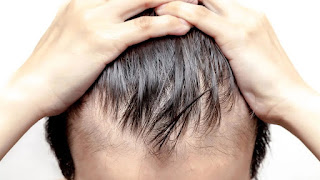Male Pattern Baldness: How to Fight Hair Loss?
One of the most prevalent types of hair loss in men is androgenic alopecia, a.k.a male pattern baldness. Male pattern baldness will affect, to varying degrees, more than fifty percent of all males who have reached the age of fifty, as stated by the National Library of Medicine (NLM). It occurs as a result of changes in hormone levels that take place during a man's lifetime, particularly in their later years.
There is a certain timeline for the development of each individual hair on your head. In men with male-pattern baldness, the hair follicle gradually decreases in size, leading to shorter, thinner hair. Each hair has its own life cycle, and when that cycle is over, no new hair will grow in its place.
Hereditary male-pattern baldness typically causes no other symptoms. Certain malignancies, medicines, thyroid disorders, and anabolic steroids can also be major causes of baldness.
Hereditary male-pattern baldness typically causes no other symptoms. Certain malignancies, medicines, thyroid disorders, and anabolic steroids can also be major causes of baldness.
How To Treat Male Pattern Baldness?
It's not surprising that finding a cure for baldness and hair loss would be a primary aim. Fortunately, there are many tried-and-tested treatments for baldness, so it's not necessarily too late to begin new hair growth.
It's not surprising that finding a cure for baldness and hair loss would be a primary aim. Fortunately, there are many tried-and-tested treatments for baldness, so it's not necessarily too late to begin new hair growth.
1. Finasteride
This oral medication for male pattern baldness has proven to be quite helpful in addressing the condition. Finasteride is effective because it lowers levels of the androgens (DHT) that cause this type of baldness. You also can buy finasteride in the form of a topical finasteride spray.
This oral medication for male pattern baldness has proven to be quite helpful in addressing the condition. Finasteride is effective because it lowers levels of the androgens (DHT) that cause this type of baldness. You also can buy finasteride in the form of a topical finasteride spray.
2. Minoxidil
Minoxidil is a topical treatment for hair loss that has been approved by the FDA, as stated in an article. If you compare it to a treatment like finasteride, which is taken orally, this one might have fewer negative side effects.
3. Biotin Vitamin
Vitamins containing biotin are not a cure for hair loss; nonetheless, biotin is a vital component in the formation of new hair. They may be able to assist your body in growing healthy hair by providing an additional boost of biotin.
4. Hair Transplant
A hair transplant is an option to consider if you are concerned about whether or not you will be able to regrow your hair after it has been lost. Get answers to your questions regarding hair loss and how to promote new growth by scheduling an online consultation with one of our medical professionals.
Revive Hair & Skin Clinic is here at your fingertips https://www.revivehairandskin.co.uk/ to help you get the best hair loss treatment at a very affordable price. We prioritize your desired results and ensure to deliver them with our experience.
.png)


%20(1).png)
Comments
Post a Comment